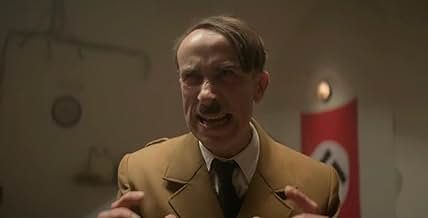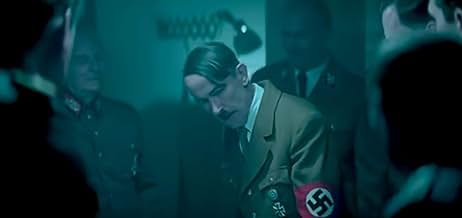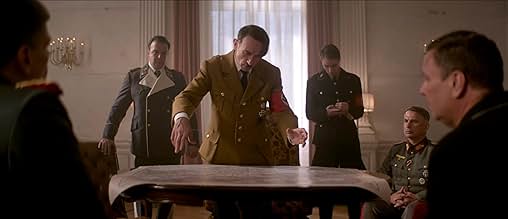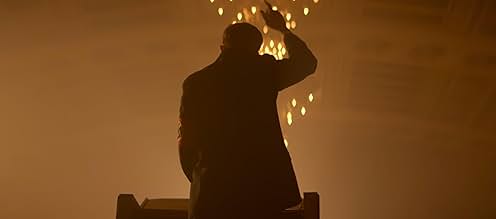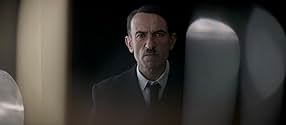Hitler et les nazis: Le procès du mal
Titre original : Hitler and the Nazis: Evil on Trial
Chronique de l'ascension d'Hitler au pouvoir, de l'utilisation par son régime de la propagande, de la censure et des politiques antisémites, ainsi que de la chute des dirigeants nazis.Chronique de l'ascension d'Hitler au pouvoir, de l'utilisation par son régime de la propagande, de la censure et des politiques antisémites, ainsi que de la chute des dirigeants nazis.Chronique de l'ascension d'Hitler au pouvoir, de l'utilisation par son régime de la propagande, de la censure et des politiques antisémites, ainsi que de la chute des dirigeants nazis.
- Récompenses
- 2 victoires et 1 nomination au total
Parcourir les épisodes
Avis à la une
Shirer's book written in the early 60's was far better and more inclusive. This skips over many relevant actions. I've read too many books about WW1 and WW2 and have always been more fascinated by the first war and how it started. The release of this documentary seems to be a not so subtle suggestion that Trump is the new Hitler. Going so far as to mention Hitler's mountain lair being the equivalent of Trump's Mar-A-Lago. Not sure how long this was in the works, but I would guess this was timed to come out before the election. It's still good but read the book instead if you want a better account of the times.
I read The Rise and Fall of the Third Reich in 1961 when I was 13 years old. In my opinion it was and still is the definitive work on Nazi Germany. While this documentary drew on William Shirer's written materials and broadcasts it fell short in several areas.
Having lived and worked in the former Soviet Union as well as the former Soviet Bloc countries, it infuriates me to see how western historians gloss over the complicity of Stalin, Molotov and Beria for their part in starting WWII. While some mention was made to the Soviet invasion of Poland and the subsequent annexation of the eastern half. There was no time spent on the Soviet invasion of Finland and the Baltics. There was no mention of the vast amount of material aid provided to the Nazi regime by Stalin. Despite Poland's invasion by both Germany and the USSR, there was no mention of why the UK and France declared war on Germany but failed to declare war on the USSR.
A brief aside during the Nuremberg trials about the fact that the Soviets committed many of the same "crimes against peace " but were not only never "put in the dock" but were allowed to judge and then allowed to enslave all of eastern Europe despite agreements to allow free elections.
No mention of the fact that Stalin was responsible for the deaths of at least ten million civilians, that Molotov's signature was alongside Ribentroff's assuring the start of the war and finally not a word on the Soviet "concentration camps" (gulags) where civilians were starved, beaten and shot to death in the millions or the many Soviet public works projects constructed with forced labor.
One last comment, the comparison of Hitler's retreat to Mar a Lago was unnecessary and stain on the great historical work by Shirer.
Having lived and worked in the former Soviet Union as well as the former Soviet Bloc countries, it infuriates me to see how western historians gloss over the complicity of Stalin, Molotov and Beria for their part in starting WWII. While some mention was made to the Soviet invasion of Poland and the subsequent annexation of the eastern half. There was no time spent on the Soviet invasion of Finland and the Baltics. There was no mention of the vast amount of material aid provided to the Nazi regime by Stalin. Despite Poland's invasion by both Germany and the USSR, there was no mention of why the UK and France declared war on Germany but failed to declare war on the USSR.
A brief aside during the Nuremberg trials about the fact that the Soviets committed many of the same "crimes against peace " but were not only never "put in the dock" but were allowed to judge and then allowed to enslave all of eastern Europe despite agreements to allow free elections.
No mention of the fact that Stalin was responsible for the deaths of at least ten million civilians, that Molotov's signature was alongside Ribentroff's assuring the start of the war and finally not a word on the Soviet "concentration camps" (gulags) where civilians were starved, beaten and shot to death in the millions or the many Soviet public works projects constructed with forced labor.
One last comment, the comparison of Hitler's retreat to Mar a Lago was unnecessary and stain on the great historical work by Shirer.
Good documentary series but not worth the build up for several weeks on Netflix. It would really be strong if important historical documentaries stuck with a solid single narrator (Peter Coyote/ Martin Sheen) & not a constant trope of random academics who provide their two sense as if they were first-hand witnesses.
Most of all, documentaties like this need to get rid of the constant 10 second frames of random individual men/ women in a semi-darkened room speaking when they can just continue with the interesting footage or re-enactments that they already have. This doc series has plenty of unique footage & decent reenactments but is ruined by the consistent random guy/ gal sitting legs crossed with a red curtain behind them.
The tones of the voices from the speakers are a bit whiny/ annoying & there does seem to be many personal opinions given without the speakers stating that what they were saying was actually an opinion. If I watch again I would write them down but I likely will not watch again. If I do I will worth the watch with closed captioning on & volume muted.
Lastly, I understand WW2 & Hitler covers tons and tons of information, but it is hard to understand how large events kinda just get muttered but then they fixate on smaller events & really blow them up. Not a word mentioned about the "Danzig Corridor". Lots of jumping around takes place but this is truly a cliff notes version of many things at best.
Most of all, documentaties like this need to get rid of the constant 10 second frames of random individual men/ women in a semi-darkened room speaking when they can just continue with the interesting footage or re-enactments that they already have. This doc series has plenty of unique footage & decent reenactments but is ruined by the consistent random guy/ gal sitting legs crossed with a red curtain behind them.
The tones of the voices from the speakers are a bit whiny/ annoying & there does seem to be many personal opinions given without the speakers stating that what they were saying was actually an opinion. If I watch again I would write them down but I likely will not watch again. If I do I will worth the watch with closed captioning on & volume muted.
Lastly, I understand WW2 & Hitler covers tons and tons of information, but it is hard to understand how large events kinda just get muttered but then they fixate on smaller events & really blow them up. Not a word mentioned about the "Danzig Corridor". Lots of jumping around takes place but this is truly a cliff notes version of many things at best.
Overall, a pretty good account of the rise of Hitler and the reign of terror perpetrated by the Third Reich. I've watched a number of similar documentaries about Hitler and this one showed me a few things I had never known.
The documentary is certainly taken down a peg by the atrocious casting of Károly Kozma as Hitler. When it comes to physical likeness, on a scale of 10 Kozma is about a 6. The casting department could have chosen from hundreds of capable actors with much more similar physical characteristics. Kozma's poor likeness to Hitler is one thing, but his abysmal performance amounts to little more than scenes of hysteria - usually unwarranted - giving Hitler very little depth. Kosta's scenes are all pantomimed (there are no speaking parts) and most of them are poorly executed. To say the least, this was a critical role and they made an awful choice by going with Kosta. You also have to blame director Joe Berlinger for encouraging Kosta's ridiculous style of performance.
There are other things that are seemingly glossed over, including Hitler's terrible health and booming drug dependency. Hitler was prescribed over 90 medications through his life, suffered from numerous serious ailments, and regularly consumed amphetamines, barbiturates, opiates, and cocaine. Between his very poor health and easy access to drugs, little wonder that Hitler devolved into the madman that he surely was.
There's also short shrift given to Hitler's pact with Japan, the courage of the British military, and various other facets of World War II. But, after all, I still did award the documentary a 7 out of 10, indicating I did find it very watchable and illuminating. It shouldn't be the ONLY documentary you watch about Hitler, but it certainly belongs in the upper echelon.
The documentary is certainly taken down a peg by the atrocious casting of Károly Kozma as Hitler. When it comes to physical likeness, on a scale of 10 Kozma is about a 6. The casting department could have chosen from hundreds of capable actors with much more similar physical characteristics. Kozma's poor likeness to Hitler is one thing, but his abysmal performance amounts to little more than scenes of hysteria - usually unwarranted - giving Hitler very little depth. Kosta's scenes are all pantomimed (there are no speaking parts) and most of them are poorly executed. To say the least, this was a critical role and they made an awful choice by going with Kosta. You also have to blame director Joe Berlinger for encouraging Kosta's ridiculous style of performance.
There are other things that are seemingly glossed over, including Hitler's terrible health and booming drug dependency. Hitler was prescribed over 90 medications through his life, suffered from numerous serious ailments, and regularly consumed amphetamines, barbiturates, opiates, and cocaine. Between his very poor health and easy access to drugs, little wonder that Hitler devolved into the madman that he surely was.
There's also short shrift given to Hitler's pact with Japan, the courage of the British military, and various other facets of World War II. But, after all, I still did award the documentary a 7 out of 10, indicating I did find it very watchable and illuminating. It shouldn't be the ONLY documentary you watch about Hitler, but it certainly belongs in the upper echelon.
Considering the voluminous information surrounding WWII, it's not going to cover every detail or aspect that one might want to see. However, I think they've managed to include the key moments of the narrative they're focusing on.
This documentary combines commentary, historical footage, and reenactment scenes. The reenactment scenes help enhance the documentary. A lot of important meetings were done behind closed doors and were not recorded, so the reenactment gives a sense of what might have happened.
I think this is a great documentary and shows how such dangerous regimes can come into power. Hopefully, although unlikely, such grand scale atrocities are behind us.
This documentary combines commentary, historical footage, and reenactment scenes. The reenactment scenes help enhance the documentary. A lot of important meetings were done behind closed doors and were not recorded, so the reenactment gives a sense of what might have happened.
I think this is a great documentary and shows how such dangerous regimes can come into power. Hopefully, although unlikely, such grand scale atrocities are behind us.
Le saviez-vous
- ConnexionsFeatured in The Andrew Klavan Show: Hooray for Heteronormativity (2024)
Meilleurs choix
Connectez-vous pour évaluer et suivre la liste de favoris afin de recevoir des recommandations personnalisées
Détails
- Date de sortie
- Pays d’origine
- Site officiel
- Langue
- Aussi connu sous le nom de
- Hitler and the Nazis: Evil on Trial
- Sociétés de production
- Voir plus de crédits d'entreprise sur IMDbPro
- Durée
- 1h(60 min)
- Couleur
- Mixage
Contribuer à cette page
Suggérer une modification ou ajouter du contenu manquant


